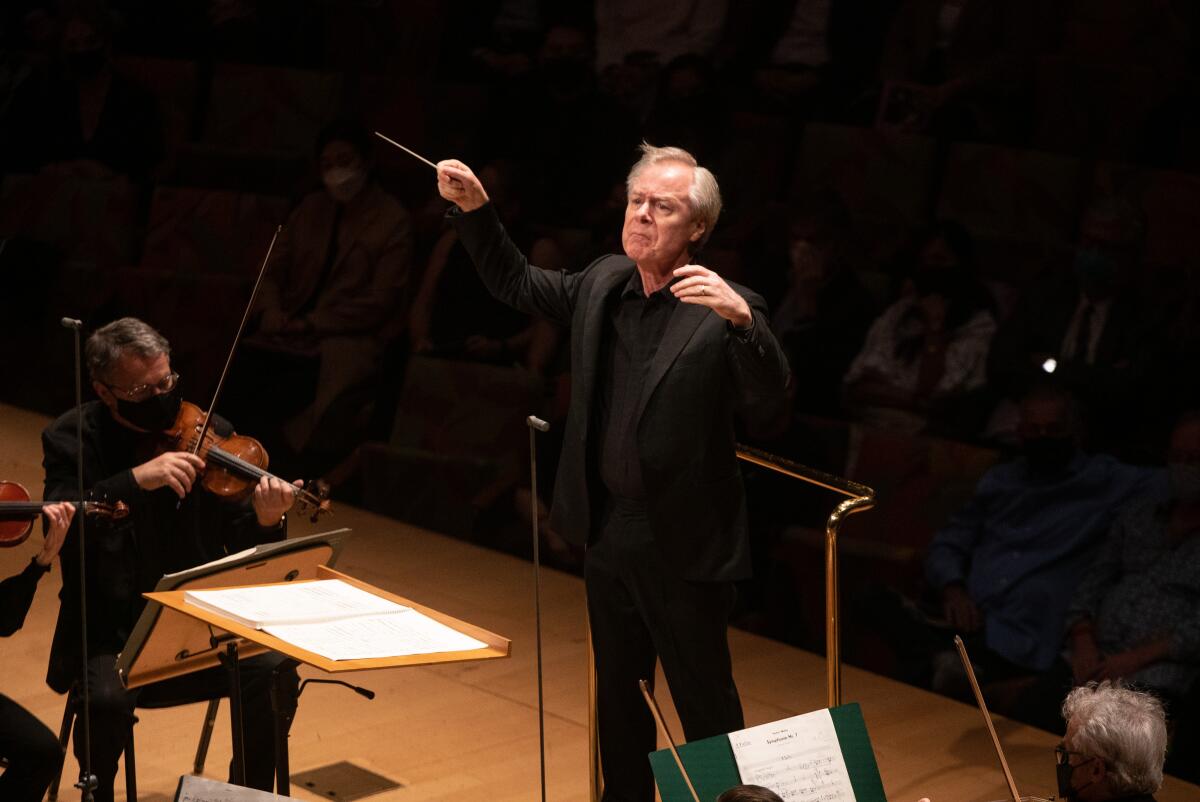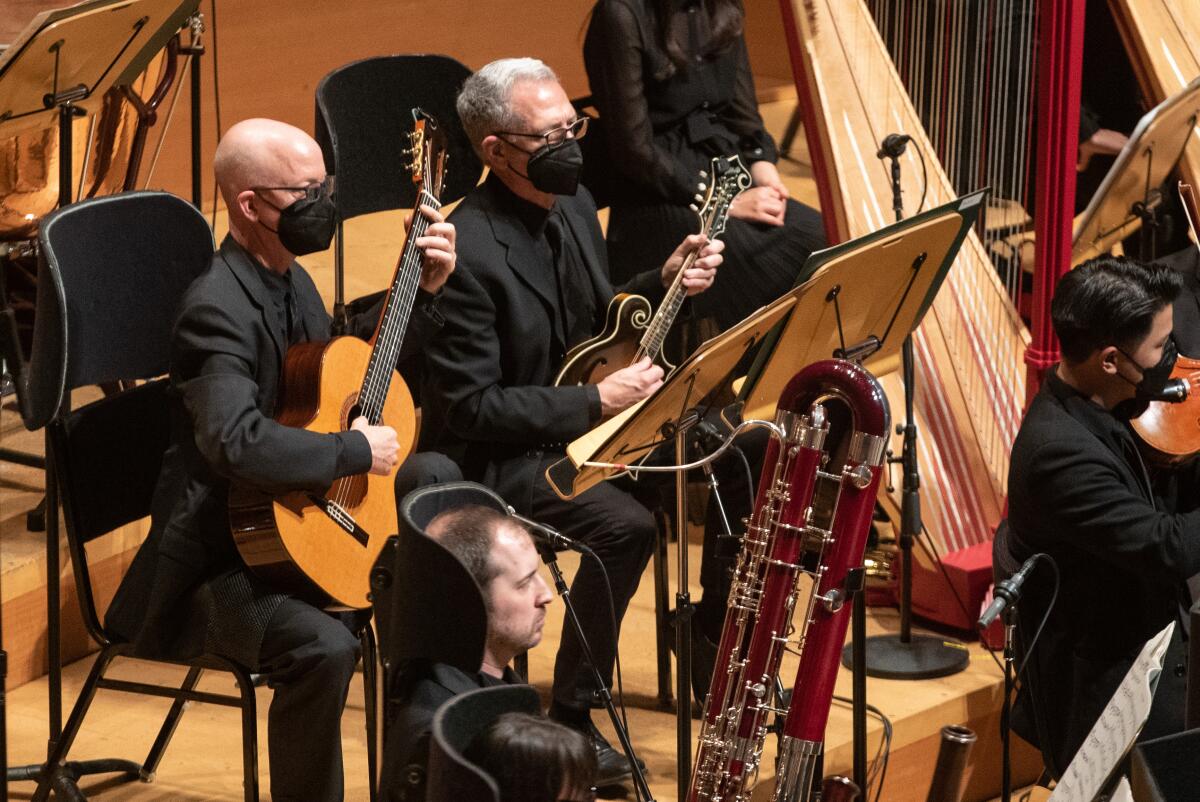The hidden message for Ukraine in Mahler’s Seventh Symphony

- Share via
The Music Center has not lit Walt Disney Concert Hall in yellow and blue, the colors of the Ukrainian flag, as has become a practice with concert halls in many cities, including Washington, D.C., and New York. Nor did the Los Angeles Philharmonic preface its performance of Mahler’s Seventh Symphony on Thursday night with the Ukrainian national anthem — the current practice of several orchestras in the U.S., Europe and Japan.
This might seem out of character for an orchestra notably daring in its willingness to address political issues and which just happens to have a “Power to the People!” festival coming up. There is no question that lighting a hall and playing an anthem can stimulate a receptiveness to serious music at hand. You listen differently; you are prepared to feel more deeply. But that is not the only approach in times of great urgency.
As a late replacement for the Russian conductor Semyon Bychkov (who injured his shoulder), the American conductor David Robertson, back at Disney Hall for the first time in five years, led Mahler’s most enigmatic, least-played symphony as if in visceral acknowledgment of war and its implications. He brought to Mahler’s funereal marches, eerie night music and decaying Viennese waltzes a shocking end-of-history fervor. Horns began loud and stayed loud, whether mournful, sentimental or braying. Percussion remained aggressive even when atmospheric. Volatile winds seemed capable of producing electric shock. The L.A. Phil string section found a stridency the players don’t usually look for. At its peak, the mighty full orchestra played with proud authority.
The Seventh is not a wartime symphony, but it is a prophetic one. Mahler wrote in it 1904 and 1905, a decade before World War I rewrote European history, which the composer did not live to witness. Harmonically, the Seventh forecast a future of atonality. Rhythmically, and in its nocturnal atmosphere, it set the tone for Bartók. Thematically, it foretold the finality of 19th century Europe.
The extravagant first and last movements are long and march-crazed, stirring and disturbing in turn. In the middle are two movements Mahler called “Night Music” that surround a waltz movement, in which the Viennese waltz is ripped apart. This may sound perfectly awful, but the wildness is a wildness of continual invention. Idyllic calmness is always mercifully just around the corner.
The orchestration is more vivid than anything that had come before it, and Mahler uses his big orchestra in ever-changing and ever-surprising chamber settings. In particular he favors solos, making this a symphony of diverse individual voices, including those not normally invited to the symphonic orchestra party. A tenor horn sings with dark luminosity in the opening movement. Cow bells, a guitar and a mandolin remind us of a world outside the symphony.

And then there’s Mahler’s heart-wrenching practice of looking back as he marches ever forward. His lyrical digressions have the capacity to magically lift a veil on the past. We remember but we don’t relive. In one extraordinary sudden turn of phrase after another, Mahler espouses a change-isn’t-easy awareness of what must be left behind to promote progress.
What does this have to do with Ukraine, or with David Robertson, a conductor from Malibu who has had a widely varied international career and who is at his best as brilliant interpreter of 20th and 21st century music? Maybe a lot.
In 1995, Robertson recorded Valentyn Silvestrov’s Fifth Symphony. The Ukrainian composer had been a rebellious avant-gardist during the Soviet period, but the remaking of music felt to him like its undoing. He dramatically changed directions and became a fixated Mahlerian. In his Fifth Symphony, Silvestrov seems desperate to retain the murky past that Mahler had to let go of. The remnants of ethereal beauty may be stripped away to almost nothing, but letting go entirely of nostalgia is death.
The good news is that Silvestrov, who is 84 and Ukraine’s most important composer, was able to get out of Kyiv in the early days of the Russian invasion. But good news stops there.
A performance of Silvestrov’s 45-minute Fifth preceding Mahler’s 80-minute Seventh is far from practical. Robertson did not disclose what was on his mind. This was his first time conducting the Seventh. With barely a week’s notice he raced to L.A. from Vienna, where he had just given the world premiere of Danny Elfman’s Cello Concerto. He was clearly out to conduct the hell out of Mahler. Robertson did not deny Mahler his glorious lyricism, but he defied his nostalgia.
That meant marches that marched with relentless energy. It meant startling percussive accents. It meant whipping up a frenzy. The wind playing was spectacular. The brass filled every sonic inch of Disney. There was no sleeping in this night music, no time to stop and smell the roses. Serenades were played to sound like figments of the imagination. Robertson was out to startle and alarm.
The audience, riveted, applauded after every movement. Whether sarcastically or jokingly, Robertson turned around after the second movement and said, “We have three encores, and you are going to like them all.” The crowd merely went on clapping after the other movements, and then, at the end, gave it up big time for each player Robertson had stand.
Neither triumph nor travesty, Robertson’s Seventh is Mahler dialed up to maximum in the time of war. When everything is on the line, you can’t always look back. That’s the only way to preserve nostalgia for the future.
David Robertson conducts Mahler's Symphony No. 7
Where: Walt Disney Concert Hall, 111 S. Grand Ave., L.A.
When: 8 p.m. Saturday and 2 p.m. Sunday
Tickets: $20-$214
COVID-19 requirements: Proof of full vaccination (no exceptions), photo ID (over 18) and masks indoors.
Info: (323) 850-2000, laphil.com
More to Read
The biggest entertainment stories
Get our big stories about Hollywood, film, television, music, arts, culture and more right in your inbox as soon as they publish.
You may occasionally receive promotional content from the Los Angeles Times.











